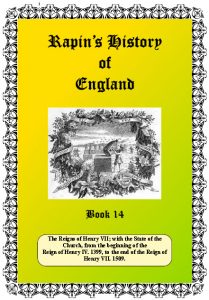BOOK XIV
THE REIGN OF HENRY VII; WITH THE STATE OF THE CHURCH, FROM THE BEGINNING OF THE REIGN OF HENRY IV. 1399 TO THE END OF THE REIGN OF HENRY VII. 1509.
Chapter I
HENRY VII
A. D. 1485
THE battle of Bosworth being ended, as was said, by the flight of the royal army, and death of King Richard, Henry caused Te Deum to be sung upon the place, all the troops falling on their knees to return God thanks for his victory. Presently after, the whole army, as it were by inspiration, made the air resound with the cry of, long live King Henry! This was a sort of military election, which might have served him for foundation to pretend to the crown, .though he had no other title.
He had, however, three titles, or foundations, whereon he could ground his right. The first was, his descent from the house of Lancaster, by Margaret his mother, daughter of the Duke of Somerset. The house of Lancaster had been possessed of the crown above sixty years, and this possession had been confirmed by many acts of Parliament. But on the other hand, several Parliaments had afterwards condemned this possession as a continual usurpation, and adjudged the crown to the house of York, as descending from Lionel, third son of Edward III.
This question, considered originally, and independently of the circumstances which moved the Parliaments to come to such opposite determinations, could not have been decided in favour of the house of Lancaster, if the laws and customs of the realm had been followed. But if, setting aside the usual practice, it should be considered with respect to the acts of Parliament, it could not be doubtful, since the Pro and Con were equally supported by the same authority. It might also be objected to Henry, that indeed sundry Parliaments had decided the point in favour of the house of Lancaster, but it did not follow that the house of Somerset could receive any advantage from that decision.
The Somersets were indeed descended from the house of Lancaster, but by a bastard branch, which could pretend to the crown only by virtue of their legitimation. Now it was a question yet undecided, whether the Act of Legitimation, and Richard the Second’s subsequent letters patent, gave to that branch, .derived from a bastard born in adultery, the right to succeed to the crown, though mentioned neither in the Act of Parliament, nor in King Richard’s letters. Besides, even upon supposition of this right, another query still arose, namely, whether the posterity of this
